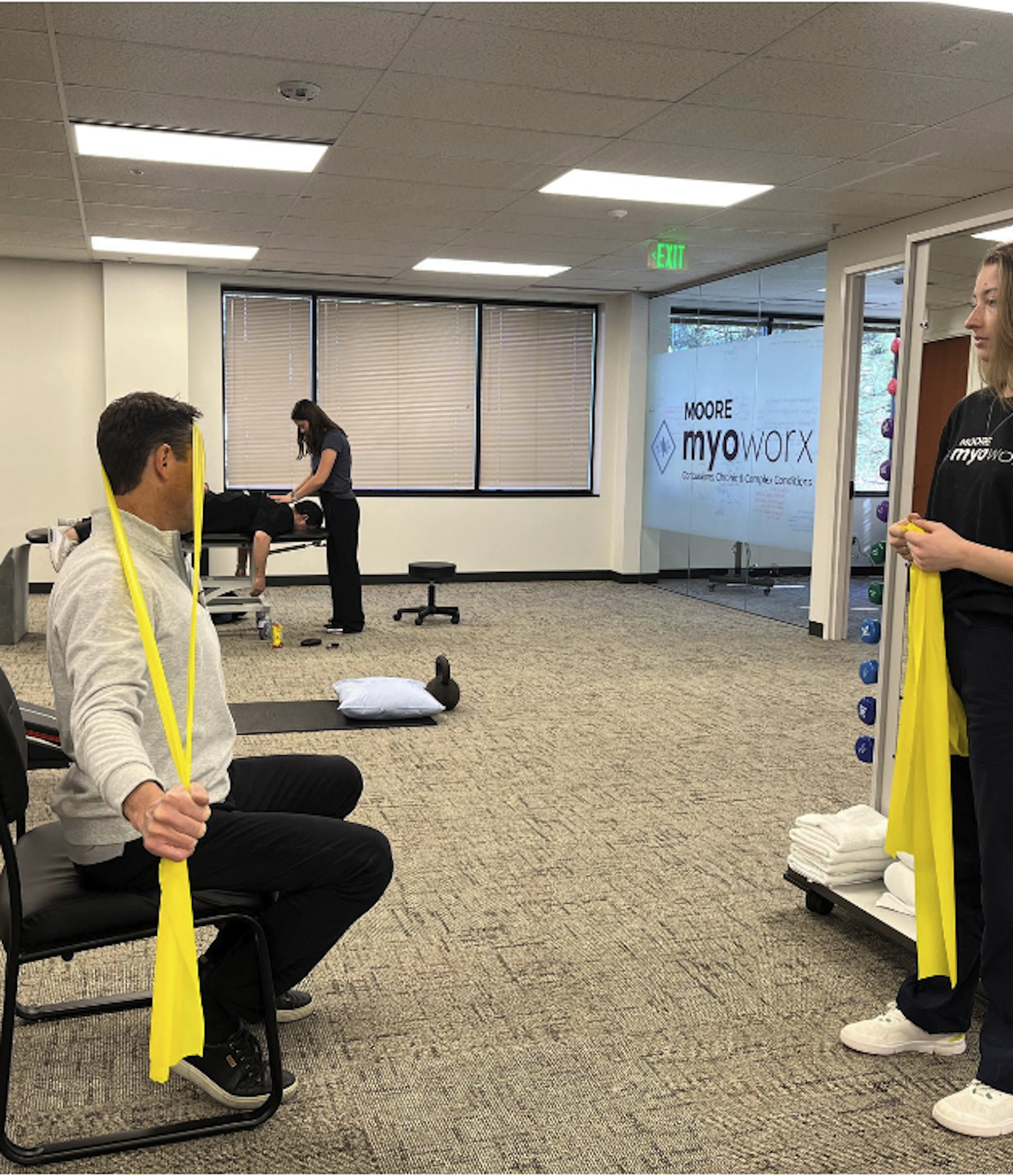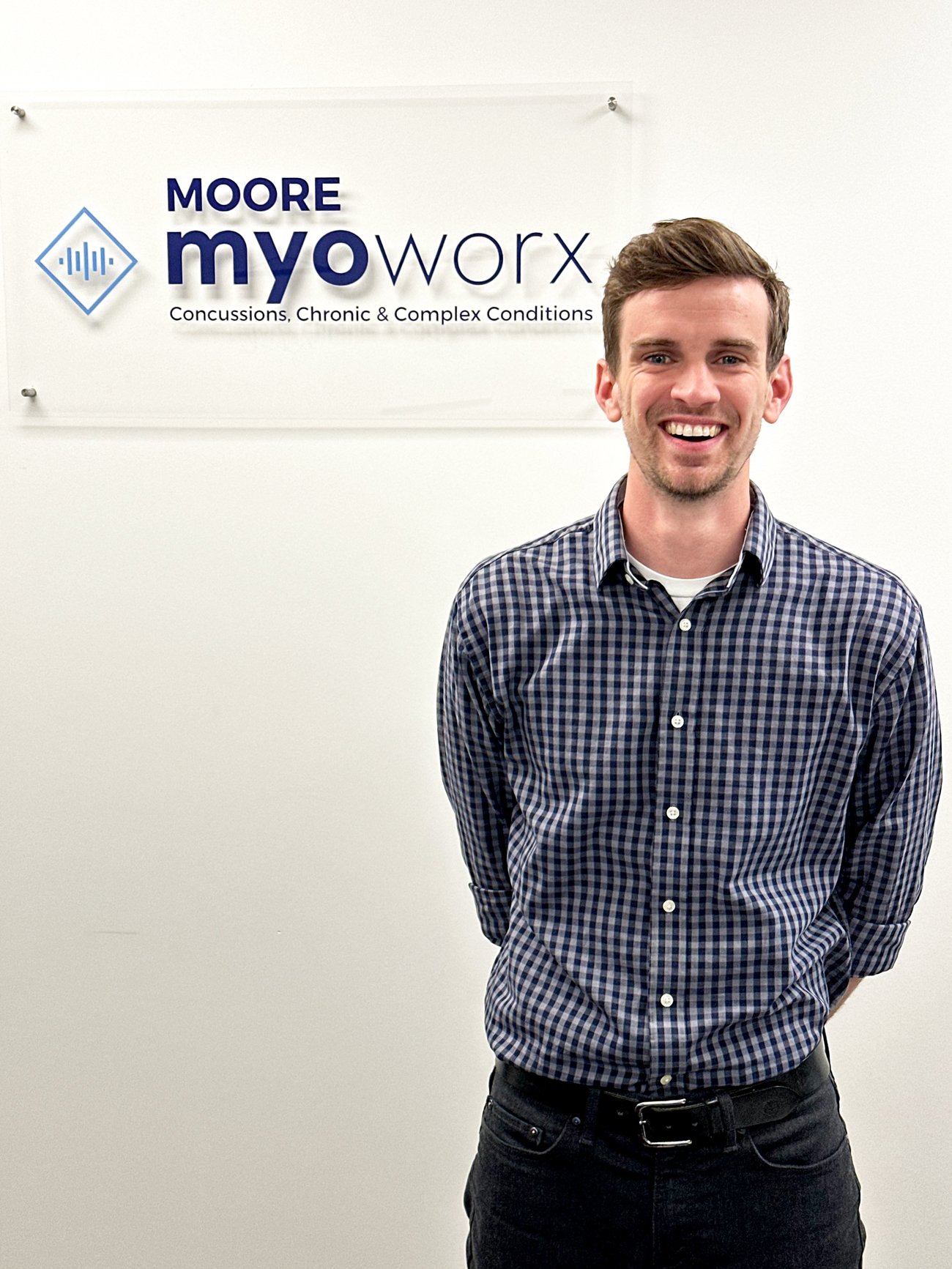Comprehensive Concussion Care: Prevention, Support, and Treatment from Diagnosis to Recovery
Often referred to as the invisible injury, Moore MyoWorx stands as a leading resource for concussion treatment
By Brennan Seevers, DPT - Moore MyoWorx Denver
There are 1.7 - 3.8 million traumatic brain injuries (TBI’s) that occur each year in the United States, according to the CDC.
Our Denver concussion clinic aims to relieve Post-Concussion Syndrome symptoms that impact our patients' daily lives. We offer a specialized neuromuscular approach, focusing on back and neck muscles often responsible for persistent headaches, brain fog, and vision problems.
Our comprehensive care guides patients from initial diagnosis through complete recovery, providing continuous support throughout their healing journey.
WHAT IS A CONCUSSION?
A concussion is a traumatic brain injury caused by the brain moving or twisting inside the skull. While common, concussions are often misunderstood. Phrases like "getting your bell rung" downplay their seriousness. Concussions and brain injuries are often called "silent injuries" because their symptoms are invisible to others. Sufferers may experience significant pain and discomfort that outsiders can't perceive, leading to misunderstanding or dismissal of their condition.
Many injured individuals push through symptoms to maintain normal life, driven by various factors:
Desire to resume regular activities
Work or family responsibilities
Reluctance to burden others
Uncertainty about treatment options
Belief that symptoms are permanent
This tendency to adapt to pain can lead to symptom desensitization, potentially worsening the condition over time. Though rarely life-threatening, concussions can have significant effects lasting days to weeks. A single concussion typically doesn't cause permanent damage, but multiple concussions over time may alter brain structure or function, potentially leading to serious health issues such as Post-Concussion Syndrome (PCS).
ARE CONCUSSIONS PREVENTABLE?
While we can't prevent concussions, at Moore Myoworx we can assess and improve key factors that may reduce risk and aid in recovery.
These assessments include:
Neck Strength: Strong neck muscles can help absorb impact and reduce brain movement during collisions. Testing methods include manual muscle testing and specialized devices measuring isometric strength. Strengthening exercises can be prescribed based on test results.
Spinal Range of Motion: Limited cervical spine mobility may increase concussion risk. Assessment includes measuring flexion, extension, rotation, and lateral flexion. Improving range of motion through targeted exercises and manual therapy can enhance overall neck function.
Visual Acuity and Processing: Visual deficits can increase vulnerability to concussions and hinder recovery.Assessments may include standard vision tests, depth perception, and eye tracking.Visual training exercises can improve eye-brain coordination and potentially reduce injury risk.
Balance and Proprioception: Poor balance may increase fall risk and susceptibility to concussions. Tests like the Balance Error Scoring System (BESS) evaluate static and dynamic balance. Balance training programs can enhance overall stability and body awareness.By regularly assessing and addressing these factors, individuals can potentially lower their concussion risk and be better prepared for safe participation in sports and daily activities.
Baseline Cognitive Function: Whether you’re recovering from a neurological condition, or seeking optimal brain health and wellness, it all starts with an engaging and scientifically-validated cognitive assessment. Establishing a baseline helps in post-injury comparison and return-to-play decisions. Additionally, having baseline measurements aids in more accurate diagnosis and management if a concussion does occur. Accurately quantifying brain function and brain health, these cognitive assessments and health questionnaires are used by our healthcare practitioners to aid in diagnosis, treatment, and proactive health monitoring of our patients. Moore MyoWorx is proud to collaborate with Creyos Health, an online brain health assessment service that precisely measures key aspects of cognitive function including:
Deductive Reasoning
Planning
Visuospatial Processing
Working Memory
Episodic Memory
Spatial Short-Term Memory
Attention
Verbal Short-Term Memory
Verbal Reasoning
ARE YOU OR YOUR CHILD AT RISK?
2 out of 10 high school athletes who play contact sports (including soccer and lacrosse) will get a concussion this year.
You are at a higher risk for concussions and brain injuries if you have already had one concussion. Even if the symptoms from the first injury have dissipated on their own, you can still be dealing with increased muscle tension and a heightened muscular response to the next potential impact.
Your muscles tense up as a defense mechanism to protect the vital components of the body, particularly around the neck and head. After one injury, it is typical for individuals to see increased tightness in the cervical musculature. Because of the nature of this response, the muscles are tight actively, not passively, thus, increasing the response to the sequential injury. While this sounds like a positive reaction, it is actually putting you at a higher risk.
Muscles that are chronically too tight, will start to lose strength and will be less protective and less absorptive on the next impact, putting you at a higher risk of getting not only another injury, but a potentially worse injury. If the muscles do not relax and maintain the proper strength after each injury, they can impinge on different nerves and blood vessels negatively impacting your healing process, causing your pain and symptoms not only to stay, but to get progressively worse over time.
POST-CONCUSSION SYNDROME SYMPTOMS
About 20% of all high school football players experience brain trauma every football season and that football is responsible for more than 60% of concussions in high school sports.
10-20% of individuals with concussions have symptoms persist for 6+ weeks, several months or years after the initial injury.
Post Concussion Syndrome (PCS) is classified as any lingering concussion or brain injury symptoms that have persisted for weeks, months, or even years after the initial injury. The symptoms that arise after a concussion or brain injury are specific to the individual. Each person can present any combination of symptoms depending on the nature of the impact and how their body reacts.
Post-Concussion Syndrome (PCS) can be elusive and present a complex array of symptoms including:
Headaches or migraines
Dizziness and balance problems
Fatigue that isn’t alleviated by rest
Difficulty with memory and concentration
Insomnia and other sleep disturbances
Increased sensitivity to light and noise
Blurred or double vision
Irritability and mood swings
Anxiety and depression
Ringing in the ears (tinnitus)
Changes in taste and smell
Slowed cognitive processing
Moore Myoworx was created to restore hope to you and your loved ones struggling with Post-Concussion Syndrome because everyone deserves the chance to live a symptom-free life. Our unique approach delves deep into the root causes of concussion-related discomforts, effectively turning the tide for those who believed they had exhausted all options.
TREATMENT
Patients benefit from personalized and intensive care, with one-on-one treatment sessions led by our neuromuscular experts.
With over 35 years of successful patient treatment from across the globe, Moore Myoworx is internationally acclaimed for its expertise in managing concussions and traumatic brain injuries (TBI).
Our approach to treatment is both targeted and comprehensive, addressing not only the symptoms but also the root causes of traumatic brain injuries. Specializing in the recovery of moderate-to-severe concussion symptoms, we employ a holistic assessment of neurological, muscular, and cognitive functions. Treatment plans are tailored to the individual needs and injury profiles of each patient, ensuring personalized care.
The effectiveness of our methods are proven, with 89% of patients experiencing symptom reduction within two weeks. Long-term follow-up studies demonstrate sustained improvements, and we continuously monitor and adjust treatment protocols to achieve optimal outcomes. We are committed to refining our methodologies through the collection and analysis of patient data. With a neuromuscular approach that is non-invasive, avoiding reliance on medications, injections, or imaging.
Patients benefit from personalized and intensive care, with one-on-one treatment sessions led by our neuromuscular experts. A comprehensive initial assessment informs the creation of individualized treatment plans, and regular progress evaluations allow for plan adjustments as needed.
Empowering patients through education is a core principle of our practice. Patients are equipped with knowledge about their condition and recovery process and are trained in self-management techniques to control ongoing symptoms. Confidence is built through guided practice and skill development, and resources are provided to support long-term wellness after discharge.
Even after treatment, Moore Myoworx offers ongoing support and follow-up. A structured follow-up program monitors patient progress, and access to expert advice is available for managing potential future symptoms ensuring that patients feel supported throughout their recovery journey and beyond.
RECOVERY
There are two main factors to consider when returning to daily activity: physical and cognitive function.
Depending on the severity of the injury and resulting symptoms, both physical and cognitive abilities can be affected. Whether or not the symptoms dissipate on their own depends on several factors. Each of these factors are specific to the individual but can account for lingering pain and symptoms.
These factors can include but are not limited to:
Severity of injury
Whether or not this was a sequential injury
Environmental and emotional stress
Physical fitness
Demands of daily living
Nutrition
While it can be exciting especially for athletes to have a return of physical function and want to get back to playing, it is vital not to ignore deficits in cognitive function as well. If you are experiencing ANY lingering symptoms, that is still considered PCS, regardless of how severe the symptom is.
Post-concussion syndrome is a complex condition, with symptoms that can persist for weeks, months, or even years after a concussion. Often misunderstood and overlooked, it can cause significant distress, disrupting lives and preventing individuals from fully participating in their daily activities.
The lingering symptoms, coupled with the uncertainty and numerous unsuccessful treatment attempts, can make it feel as though relief is unattainable. Understanding the challenges of post-concussion syndrome, we have dedicated our expertise to developing a data-driven, evidence-based approach to treatment. Our clinic is more than just another stop on your healthcare journey—it’s a place where success is achieved.
“When I first started treatment at Moore MyoWorx, I was anxious and hopeless after 5 months of persistent post concussive syndrome. After only one visit, I felt significantly better and my symptoms only improved from there. Lily and Taylor were incredible, and like the rest of the staff, they were knowledgeable, welcoming, and supportive throughout the entire treatment. After two weeks and six sessions, I am confidently back to being me again, and living out my normal daily life with zero to minimal pain thanks to this amazing facility. I could not recommend this place more, it is easily worth the time, money, and commitment. Thank you Moore MyoWorx!” - Kate
If you or someone you know suffers from post-concussion syndrome or chronic pain of any sort, please share this information with them and encourage them to reach out to us at Moore Myoworx! We can begin your recovery together!
Learn about all the conditions we specialize in and more about our history and 35+ years of patient successes.
Schedule a free introductory session with our Denver clinic today by calling us at (970) 592-8306 or by contacting us here.
Brennan Seevers is the Clinic Director at Moore MyoWorx Denver. He graduated from Bethel College with an undergraduate degree in Exercise Science and received his Doctorate in Physical Therapy from the University of Indianapolis. Brennan takes pride in his holistic approach to the human body and is passionate about understanding each patient's story.





